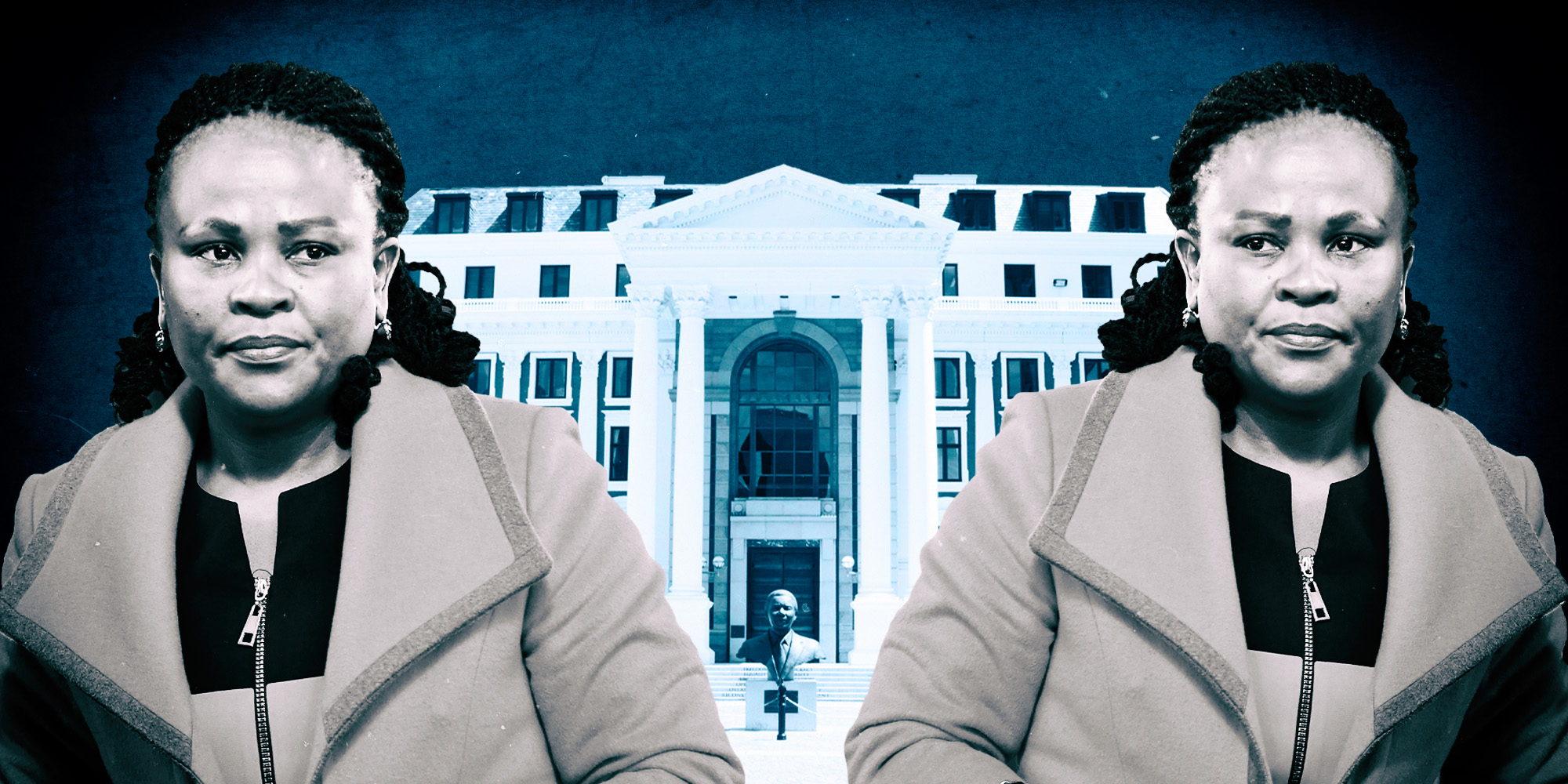Western Cape High Court Judge Vincent Saldanha firmly dismissed Public Protector Busisiwe Mkhwebane’s claim of irreparable harm, bias and prejudice should the parliamentary removal inquiry under section 194 of the Constitution proceed. He also dismissed as unsubstantiated the Public Protector’s claims of bias and bad faith by National Assembly Speaker Thandi Modise and the motivator of the removal proceedings, the DA.
Emphasising public interest, Saldanha in an 89-page judgment said:
“It is moreover not only in the public interest, but of equal importance are considerations by this court of not unduly intruding into the terrain of the National Assembly that is constitutionally mandated of holding the applicant (Mkhwebane) accountable. Such a function of the National Assembly is principally and constitutionally in the public interest.”
Dismissing the interdict application, the judge said he would have erred on the side of discretion refusing the Public Protector’s request, “given the severity of the charges that had been preferred against her and which have been based on trenchant findings by none higher than the Constitutional Court with regard to her conduct, her honesty and methodology of investigation”.
This is a reference to the complaint motion in support of the removal inquiry against Mkhwebane in which the DA had cited a range of scathing comments by judges about the Public Protector’s conduct. Mkhwebane is on public record, saying this was not unusual as like a judge her reports and remedial actions could be reviewed.
“… (T)here is serious prejudice to the public interest, coupled with the separation of powers harm to the National Assembly, if the process does not ensue,” said the judgment. The impeachment of a head of a chapter 9 institution established in the Constitution to support democracy could not be taken lightly.
Parliament’s removal inquiry – a 17-step process according to the rules unanimously adopted by the House in early December 2019 – may well eventually result in a political decision by a vote in the National Assembly. Section 194 of the Constitution requires a two-thirds majority in the House for the removal of the Public Protector and Auditor-General.
Effectively, Friday’s judgment has upheld the arguments made by Parliament during the mid-August hearing that as the national legislature, given its role in the selection of the Public Protector, it also had a say in any removals. That was part of the National Assembly’s constitutional function, or the “ultimate accountability mechanism”, as the Western Cape High Court was told then.
https://www.dailymaverick.co.za/article/2020-08-14-parliaments-impeachment-inquiry-into-public-protector-the-ultimate-accountability-mechanism-and-in-the-public-interest/
Mkhwebane’s advocate, Dali Mpofu, had argued it was all a vendetta, and claimed bias and bad faith. But judges were left unimpressed by the advocate describing the parliamentary removal proceedings as akin to the Sobukwe Clause – the apartheid legislature’s May 1963 General Law Amendment Act that annually extended Pan Africanist Congress leader Robert Sobukwe’s solitary confinement on Robben Island until May 1969. Even if Mpofu later changed tack to argue it was the DA, not Parliament.
https://www.dailymaverick.co.za/article/2020-08-13-judge-unimpressed-by-claim-of-da-vendetta-against-public-protector/
On Friday Saldanha, in his concluding remarks, pointed to the importance of public interest – and the need to live up to the values and aspirations of the Constitution. Like the courts that are not immune from public scrutiny, neither are public office bearers. While the Public Protector may be criticised, it was important this was not seen as undermining her office and its constitutional powers.
Drawing attention to MPs’ oath of office that swears loyalty to the Constitution, Saldanha said:
“While ‘Justice is blind’, the eyes of the court remain wide open and so too does its doors to ensure that a process as profound unprecedented and solemn as that of a removal in terms of section 194 of a head or office bearer of a hallowed chapter 9 institution is not reduced to a platform for gratuitous vilification or the unlawful action against any person.
“The public looks also to the Speaker in the National Assembly to ensure and maintain both the credibility and respectability of the entire process.”
No punitive cost order was made against Mkhwebane, although she’s been ordered to pay all parties’ legal costs.
The judgment is a significant endorsement of Parliament’s constitutional responsibility and its status as the legislative sphere of state.
On Thursday it emerged the removal inquiry was proceeding. The independent panel that considers if a case must be answered had to be reconstituted after the first set of nominees declined for one potential conflict or another.
“We had to look at all the candidates and make sure no candidate is used to discredit whatever decision the panel takes,” Modise told Thursday’s programming committee.
https://www.dailymaverick.co.za/article/2020-10-09-inquiry-to-remove-public-protector-to-go-ahead-while-mkhwebane-complains-of-being-ignored/
Names for that panel are now before the Speaker, who must announce the panel and its starting date. It is the third of 17 steps if it were to come to a removal inquiry under the rule “Removal of Office Bearers in Institutions Supporting Constitutional Democracy”.
If the panel decides there’s no case, the removal inquiry ends then and there. If it’s recommended, Mkhwebane faces a removal committee, the next 14 steps unfold – much of it in public. DM





 Illustrative image | sources: The process has begun to appoint a new public protector, with suspended Public Protector Busisiwe Mkhwebane's term ending in October. (Photo:Netwerk24 story Christiaan du Plessis/Felix Dlangamandla) / Parliament (Photo: Leila Dougan)
Illustrative image | sources: The process has begun to appoint a new public protector, with suspended Public Protector Busisiwe Mkhwebane's term ending in October. (Photo:Netwerk24 story Christiaan du Plessis/Felix Dlangamandla) / Parliament (Photo: Leila Dougan)